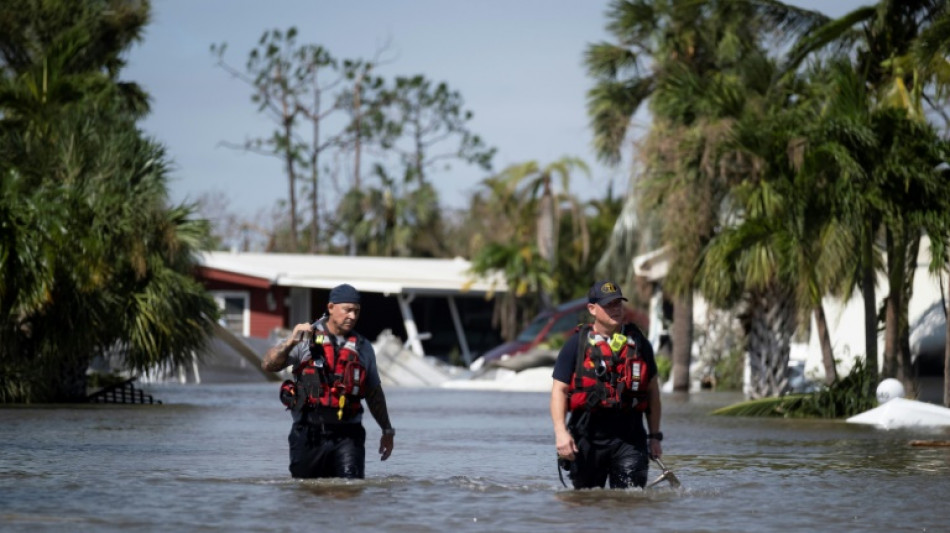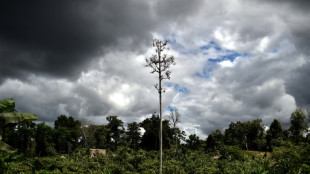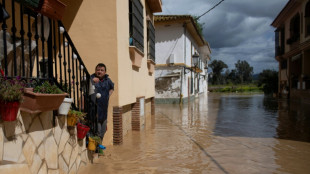

Hurricane Ian heads to Carolinas after regaining strength in Atlantic
Forecasters expect Hurricane Ian to cause life-threatening storm surges in the Carolinas on Friday after unleashing devastation in Florida, where it left a yet unknown number of dead in its wake.
After weakening across Florida, Ian regained its Category 1 status in the Atlantic Ocean and was headed toward the Carolinas, the US National Hurricane Center said Friday.
"Flooding rains (are) likely across the Carolinas and southwestern Virginia," the NHC added.
The storm, one of the most powerful ever to hit the United States, left hundreds of people in need of rescue in Florida, Governor Ron DeSantis said, warning it was too early to get a clear picture of the death toll.
"We absolutely expect to have mortality from this hurricane," he said Thursday.
DeSantis said concrete information about casualty numbers could be expected "in the coming days."
President Joe Biden, after a briefing at the Federal Emergency Management Agency (FEMA) headquarters, said "this could be the deadliest hurricane in Florida history."
The numbers "are still unclear, but we're hearing reports of what may be substantial loss of life," he said Thursday.
Biden later declared an emergency in South Carolina, ordering federal assistance in response efforts, according to a White House statement.
The NHC has issued a hurricane warning for the entire coast of South Carolina as well as portions of Georgia and North Carolina.
Ian would likely make landfall on Friday, the NHC said, and then "rapidly weaken over the southeastern United States late Friday into Saturday."
- 'Horrifying' -
Fort Myers, where Ian came ashore as a powerful Category 4 hurricane on Wednesday, took much of the brunt, as streets became rivers and seawater poured into houses.
Dozens of boats moored in the marina were sunk while others were tossed onto downtown streets.
DeSantis described the destruction in the southwest part of his state as a "500-year flood event."
"We've never seen storm surge of this magnitude," he said.
Tom Johnson of Fort Myers had a front row seat to the destruction from his apartment on the second floor of a two-story harbourside building.
"I was scared because I've never been through that," the 54-year-old told AFP. "It was just the most horrifying sounds with debris flying everywhere, doors flying off."
His home was undamaged but one of his neighbors, Janelle Thil, was not so lucky and had to ask other residents for help after her ground floor apartment began to flood.
"They got my dogs and then I jumped out of the window and swam," the 42-year-old said.
When Thil returned to her apartment after the storm passed, she said she opened the door and "had to wait about five minutes for all the floodwaters to come out."
"I loved my home," she said. "But I'm alive and that's what matters."
A US Coast Guard official said Thursday that helicopter crews were plucking people from the rooftops of homes inundated by floodwaters.
Eighteen migrants were missing from a boat that sank during the hurricane on Wednesday, though nine others had been rescued, the Coast Guard said. Among them were four Cubans who swam to shore in the Florida Keys.
- 'Major disaster' -
Much of Florida's southwest coast was plunged into darkness after the storm wiped out power.
Tracking website PowerOutage.us said 2.1 million homes and businesses remained without electricity in the Sunshine State on Friday.
Two barrier islands near Fort Myers, Pine Island and Sanibel Island, popular with vacationers, were essentially cut off when the storm damaged causeways to the mainland.
Sanibel got "hit with really biblical storm surge," DeSantis said, and rescuers were using boats and helicopters to evacuate residents who rode out the storm.
Biden has declared a "major disaster" in Florida, a move that frees up federal funding for storm relief.
"I want the people of Florida to know that we will be here at every step of the way," he tweeted.
- Cuba power out -
Before pummeling Florida, Ian plunged all of Cuba into darkness after downing the island's power network.
Electricity was gradually returning Thursday, but many homes remain without power.
Laura Mujica joined dozens of Cuban women gathered in the capital Havana on Thursday to demand electricity be restored in the city.
"We women decided to take to the streets to empower ourselves and protest so that the electricity will be fixed," said the 20-year-old.
At least two people died in Pinar del Rio province, state media in the country of more than 11 million reported.
Human-induced climate change is resulting in more severe weather events across the globe, scientists say.
E.Winandy--LiLuX



